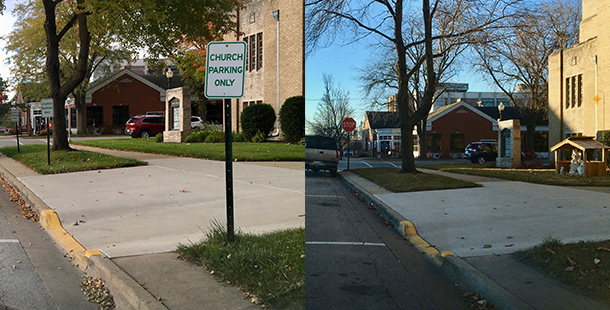
The city of Morris has agreed to stop a discriminatory parking policy favoring churchgoers after the Freedom From Religion Foundation stepped in.
The presence of four “church parking only” signs prohibiting area residents from parking on a public street near a church created a discriminatory privilege for churchgoers, FFRF told Mayor Chris Brown.
“This not only confers endorsement and advancement of religion but also fosters excessive entanglement between the city and a church,” FFRF Legal Fellow Karen Heineman wrote. “The Supreme Court has struck down such entanglements between government and religious actors.”
The subsidy for church parking is significant because the church, unlike a secular counterpart, does not pay taxes to contribute to public streets and public parking options. By providing church parking, the entire city is subsidizing free parking for churchgoers. If parking is limited immediately in front of a church, it is not for the city to resolve by granting special treatment.
These signs allowed a religious organization to control the enforcement of parking on a public street in Morris. The city’s treatment of parking was preferential toward churchgoers and exclusionary toward residents and neighbors who do not attend the church. The city’s bestowal of special parking benefits to a select church couldn’t be reconciled with the Constitution, FFRF insisted.
FFRF’s constitutional parking lessons fell on receptive ears.
In an email from the city of Morris’ counsel Garrett Wheeler, FFRF was reassured: “The city looked at the issue once it was brought to the city’s attention and determined the signs were erected without city council approval, so they were removed by the church.”
FFRF is always pleased to guide folks to the right spot.
“The blatant favoritism that the city of Morris was displaying is a prime example of Christian privilege at work,” says FFRF Co-President Dan Barker. “The city made the constitutionally right decision by removing the signs.”
FFRF is a national nonprofit organization with more than 35,000 members and several chapters across the country, including over 1,100 members and a chapter in Illinois. FFRF’s purposes are to protect the constitutional principle of separation between state and church, and to educate the public on nontheism.

